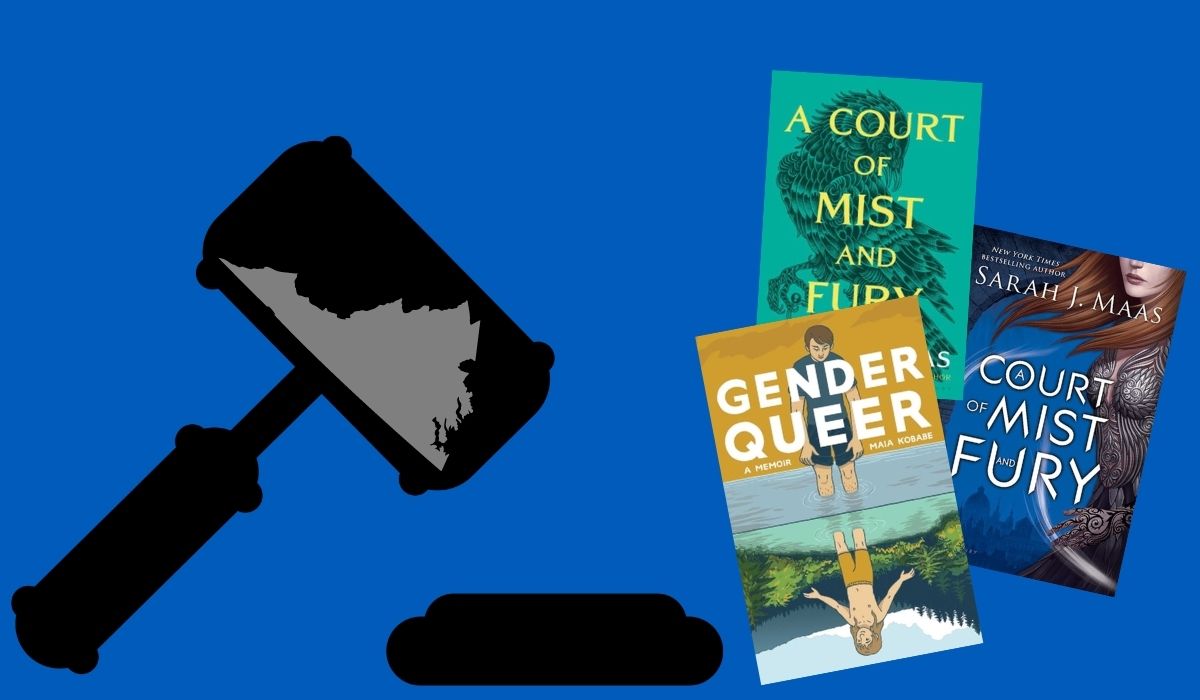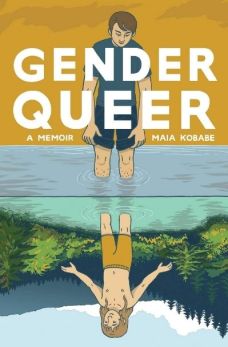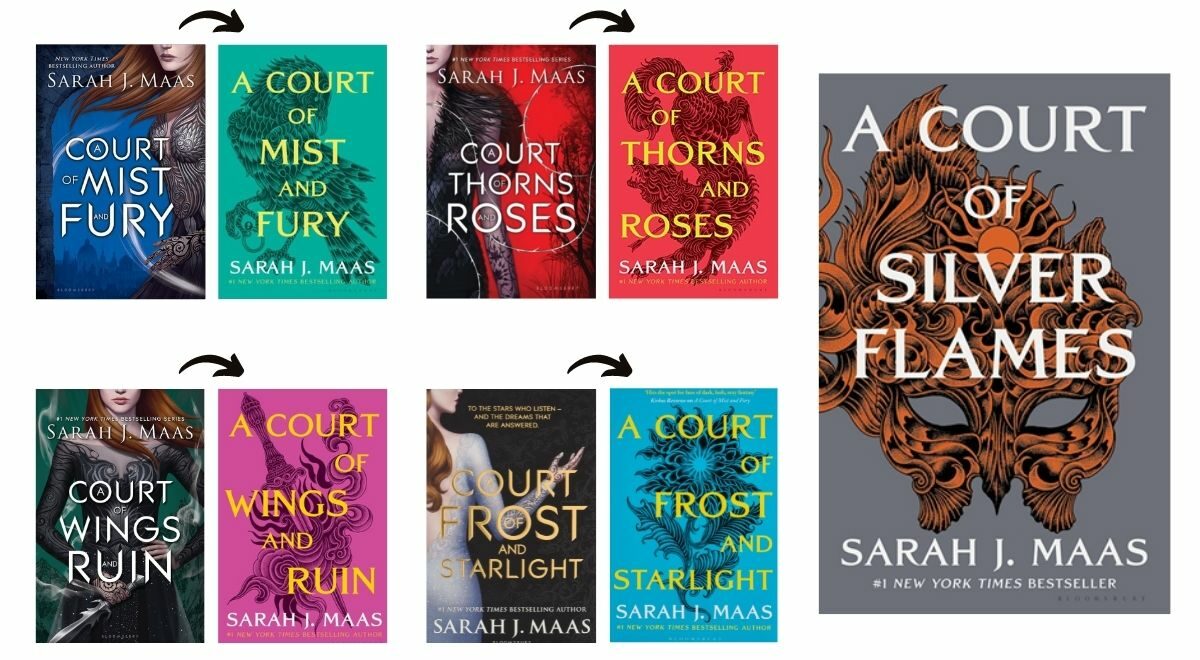Virginia Judge Restricts Booksellers From Selling 2 YA Books Accused of Being “Obscene”

After overwhelming successes, by conservative groups, in getting books banned and censored in the classroom and school libraries, you’d think they would be done, right? Pack it up and go home while we try to undo this mess? Nope. In addition to putting final touches on public libraries, some people are taking it a step further by challenging which books can even be sold in bookstores.
Republican lawyer and Virginia House of Delegates member Tim Anderson filed a lawsuit on behalf of his client, Virginia congressional candidate Tommy Altman, to stop kids from getting Gender Queer by Maia Kobabe and A Court of Mist and Fury by Sarah J. Maas from private booksellers like Barnes & Noble. Under the guise of protecting kids, they are calling the work “obscene” and pushing for Barnes & Noble to require parent or guardian permission to sell the work to minors.
When Book Riot first broke this story on May 19, there was no response from Barnes & Noble, and Anderson posted documents on Facebook showing the paperwork. I kid you not, the case number for Maas’ “Order to Show Cause” is CL22-1984. Not to engage with numerology, but it’s just eerie that the number is the same as the name of George Orwell’s famous text. Retired Virginia Beach Circuit Court judge Pamela Baskervill placed a preliminary injunction against booksellers while she reviews the titles. This prohibition on selling and distributing the titles applies to everyone, regardless of age.
Why these books?
Fellow TMS writer Ana Valens went deep into this over a week back, but I wanted to add some more context, especially in Maas’s case, since it’s not cut and dried bigotry.

Those who have been paying any sort of attention to the book challenges, bans, and more happening in the last year or so will not be surprised to see Kobabe’s book challenged. The graphic novel memoir shares the account of what it was like for Kobabe to grow up nonbinary and asexual. As an LGBTQ+ book intended for young adults with an image-focused medium, it has been the book for conservatives to go after. The American Library Association’s Office for Intellectual Freedom cited it as the most challenged book of 2021, and LGBTQ+ stories made up about half of the top 10 list.
Sarah J. Maas’ A Court of Mist and Fury is a different type of complicated. While the series was originally published and housed under youth literature, publisher Bloomsbury has since recategorized it as adult fiction. The series started as something younger-YA and then became faerie romance by book two (a.k.a. the book being challenged). It’s basically a meme at this point. Other than raking in coin from collectors, some readers who keep up with publishing believe this is part of the reason they changed the covers of the books.

The most popular example I can think of, unfortunately, is Harry Potter. The first two books are clearly children’s literature, but by the end of the series, the novels are definitely for teens—not just because of the subject matter, but because readers were growing up with them. Coming-of-age stories (and AP texts) are always under scrutiny from censors because that time is in flux. Maas’ work begins as something for people at the end of middle school and develops into something more mature for teens. You can see the Common Sense Media rating (not an end-all-be-all, just an example) fluctuate greatly between four books. Then, there is a disconnect between what adult (not necessarily educators, librarians or psychologists) and teen reviewers think is suitable.
TikTok has kept the series still very popular and circulating among teens. Every library is handling this differently. Booktuber Jess Owens (who recently made a video about this controversy) said the military base library where she’s living is also behind on recategorizing this, as well. Regardless, in both situations, the push to ban or censor these titles “for the children” is really a push to parent other people’s kids. If you don’t want your kid to read these books at the library or buy it at the bookstore, then be an active parent instead of limiting everyone else’s experience in the public and, now, private space.
Booksellers respond
In an open letter published by the National Coalition Against Censorship, they and others (see below) they took a firm stand against this attack:
Those who care about individual liberties and the freedom to read should understand precisely what the law requires, should the petitioners succeed: the law in question will make it illegal for any bookstore to sell these books in Virginia. This petition aims to prevent readers from making a personal choice to read these books at all. The petitioners’ subsequent statements to the press make it clear that they intend to use this action as a means to criminally prosecute librarians, booksellers, and publishers.
Over the years, many people have tried to ban books by claiming that they are obscene. If persons like the petitioners obtain similar orders every time they have objections to a book, it will chill the freedom to read and stifle the voices of authors and publishers. Librarians, educators, authors, publishers, and booksellers will be targeted for making available books that everyone has the right to choose to read.
- National Coalition Against Censorship
- American Civil Liberties Union (ACLU)
- ACLU of Virginia
- American Booksellers for Free Expression
- American Library Association
- Association of American Publishers
- Authors Guild
- Barnes & Noble Booksellers
- Comic Book Legal Defense Fund
- Freedom to Read Foundation
- National Council for Social Studies
- National Council of Teachers of English
- PEN America
- Virginia Association of School Librarians
- Woodhull Freedom Foundation
Local (Virginia Beach) independent bookstore, The Violet Fox Bookshop, joined the fight by informing its patrons of this issue, links on next steps, and why this matters.
Finally, banning books sends a message to our educators, our teachers and librarians, that although they went to school for many years and work with kids every day, their wisdom and experience isn’t trustworthy or valuable. Also not good.
Now, when a book is banned from a particular school or library, people think, well, I can just go buy the book if me or my kids want to read it. And that’s usually true. But what’s happening here in Virginia has gone beyond a single school district or library. It has extended out into the general public. To put it simply, a Virginia judge is currently evaluating whether certain books should be allowed to be sold or owned by anyone (adults or minors) in the state of Virginia.
The judge could decide that these particular books are “obscene” enough that they should be illegal to sell, buy, or own anywhere in the state. And if that happens, any school, bookstore, library, or private citizen who is caught with these books on their shelf could be criminally prosecuted.
This is the bad place
Outside of this case, Wavy reported that Anderson filed a Freedom of Information Act request for the names of all head librarians where these books (in addition to Lawn Boy by Jonathan Evison and Saga by Brian K. Vaughan & Fiona Staples) can be found. The educators and their families will be at risk of being publicly labeled pedophiles just for being decent librarians.
I’d like to believe that this ridiculous case, once finished, will result in the books going back on bookshelves at Barnes & Noble, at the very least. If there is a ruling that requires some sort of selling procedures like these books are cigarettes, it will discourage sellers and publishers from carrying whatever the local Cristofascist believes isn’t wholesome enough to pass a purity test (which the Bible would fail, for the record).
Other than readers, the biggest blow would be to indie authors and bookstores. I doubt most independent bookstores would be able to survive the court fees alone. This isn’t an even the worst possible case. The worst case is the state deeming it illegal to own these books at all, much like a famous Ray Bradbury book.
Regardless of how successful this is, this effort will embolden copycat suits until something sticks. Another person planning on taking legal action to limit who Barnes & Noble can sell books to, Stacey Langton, told a Fox 5 station that if this case doesn’t go her way, she plan on filing an appeal and taking it up to the Supreme Court. At the very least, this mess will embolden more fake moral grandstanding in which people demonize and misrepresent the truth in order to run a successful campaign by leveraging fake culture wars and moral panic.
(via BookRiot, featured image: Alyssa Shotwell, Bloomsbury, and Oni Press)
—The Mary Sue has a strict comment policy that forbids, but is not limited to, personal insults toward anyone, hate speech, and trolling.—
Have a tip we should know? [email protected]
